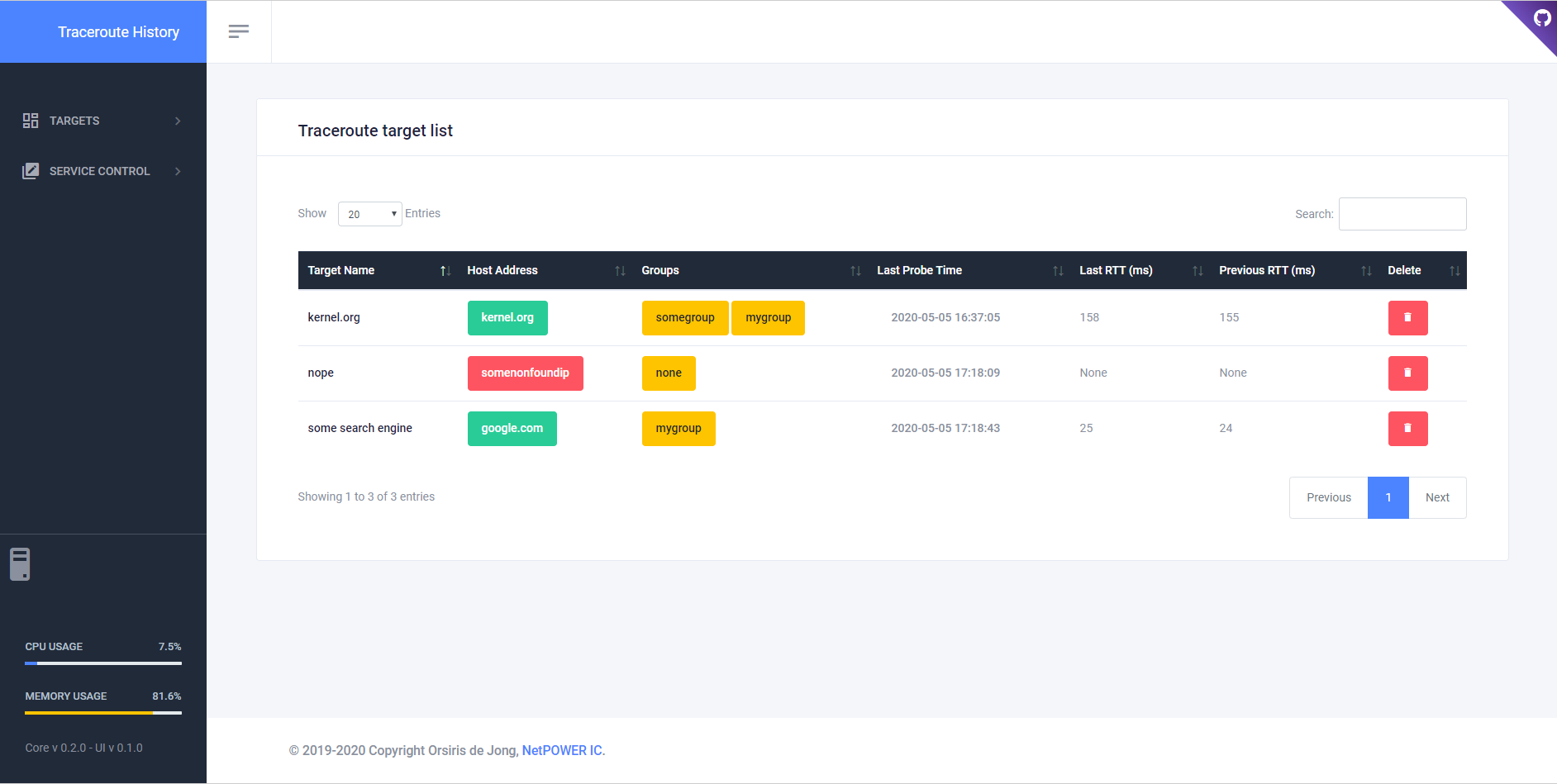Traceroute History is under heavy developpment (see TODO.TXT).
Traceroute History records Unix traceroute & Windows tracert outputs to a database, upon host changes in hops, or big rtt increases to hops. The core can be run as a service or as a cron task, both providing regular probe updates. It can be run via cron / task scheduler or as service.
-
Install traceroute binary via
dnf install traceroute. On Windows, binarytracertshould be included in system32 directory. -
Install development tools via
dnf install python3-devel gcc makein order to compile required python modules. -
Install requirements via
pip -m install -r requirements.txtandpip -m install -r requirements-python36.txtif you run with Python 3.6 -
Adjust the configuration file
traceroute_history.confaccording to your needs. -
Initialize the database
traceroute_history_runner.py --config=traceroute_history.conf --init-db -
Run as cron task with
traceroute_history_runner.py --config=traceroute_history.conf --update-nowExample of a cron entry in /etc/crontab
30 * * * * root /usr/bin/python3 /opt/traceroute_history/traceroute_history_runner.py --config=/opt/traceroute_history/traceroute_history.conf --update-nowor run as service
traceroute_history_runner.py --config=traceroute_history.conf --daemon
There's currently a CLI and a GUI interface available. CLI can be executed directly via the script, eg:
traceroute_history_runner.py --help
GUI relies on FastAPI and uvicorn modules.
GUI can be launched via user_interface.py and will by default listen on 127.0.0.1:5001. Bind ip and port be modified in traceroute_history.conf.
Additionnaly, a systemd file is provided for launching the user interface in extras
cp extras/traceroute_history_ui.service /usr/lib/systemd/system
systemctl enable --now traceroute_history_ui
systemctl status traceroute_history_ui
Traceroute History can directly read smokeping configuration files in order to add them as probe targets. It also provides a FastCGI script that can be directly integrated into smokeping:
In your smokeping virtualhost add
<Directory "/path/to/traceroute_history">
require all granted
</Directory>
Alias /smokeping_th_helper.fcgi /path/to/traceroute_history/smokeping_th_helper.fgci
You need to install fcgiwrap for CGI wrapper interact with Nginx:
- Debian/Ubuntu:
apt install fcgiwrap - CentOS/RHEL:
yum install fcgiwrap
Then configure Nginx with the default configuration:
cp /usr/share/doc/fcgiwrap/examples/nginx.conf /etc/nginx/fcgiwrap.conf
Make symbolic link for smokeping_th_helper.fcgi:
ln': ln -s /opt/traceroute_history/smokeping_th_helper.fcgi /usr/lib/cgi-bin/smokeping_th_helper.fcgi
In your smokeping virtualhost add
location = /smokeping/smokeping_th_helper.fcgi {
alias /opt/traceroute_history/smokeping_th_helper.fcgi;
fastcgi_intercept_errors on;
fastcgi_param SCRIPT_FILENAME /usr/lib/cgi-bin/smokeping_th_helper.fcgi;
fastcgi_param QUERY_STRING $query_string;
fastcgi_param REQUEST_METHOD $request_method;
fastcgi_param CONTENT_TYPE $content_type;
fastcgi_param CONTENT_LENGTH $content_length;
fastcgi_param REQUEST_URI $request_uri;
fastcgi_param DOCUMENT_URI $document_uri;
fastcgi_param DOCUMENT_ROOT $document_root;
fastcgi_param SERVER_PROTOCOL $server_protocol;
fastcgi_param GATEWAY_INTERFACE CGI/1.1;
fastcgi_param SERVER_SOFTWARE nginx/$nginx_version;
fastcgi_param REMOTE_ADDR $remote_addr;
fastcgi_param REMOTE_PORT $remote_port;
fastcgi_param SERVER_ADDR $server_addr;
fastcgi_param SERVER_PORT $server_port;
fastcgi_param SERVER_NAME $server_name;
fastcgi_param HTTPS $https if_not_empty;
fastcgi_pass unix:/var/run/fcgiwrap.socket;
}
In your smokeping basepage.html file (generally in /opt/smokeping/etc), add the smokeping_th_helper.js script after the other scripts.
Your source should look like:
<script src="js/prototype.js" type="text/javascript"></script>
<script src="js/scriptaculous/scriptaculous.js?load=builder,effects,dragdrop" type="text/javascript"></script>
<script src="js/cropper/cropper.js" type="text/javascript"></script>
<script src="js/smokeping.js" type="text/javascript"></script>
// Added script
<script src="js/smokeping_th_helper.js" type="text/javascript"></script>
Also copy smokeping_th_helper.js to your www/js folder.
